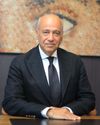
Jonathan Ross's first inkling that something was wrong came back in February while he was speaking to a host of Norwegian Parliament members and tech execs in Oslo. Ross, the 42-year-old CEO of AI chip startup Groq, was in the middle of a demo he hoped would vitalize the languishing company: an AI chatbot that could answer questions almost instantaneously, faster than a human can read. But, for some reason, it was lagging slightly. It unnerved Ross, who was pitching a Groq-powered European data center that would showcase the specialized chips responsible for those super-fast answers. "I just kept checking the numbers," he recalls.
"People didn't know why I was so distracted." The culprit was an influx of new users. A day before Ross's Oslo meeting, a viral tweet from an enthusiastic developer raving about "a lightning-fast AI answer engine" sent tons of new traffic to the online demo, buckling the company's servers. It was a problem, but a good one to have.
When he founded Groq eight years ago, Ross’s idea was to design AI chips explicitly for what’s known in the industry as “inference”: the part of artificial intelligence that mimics human reasoning by applying what it’s learned to new situations. It’s what enables your smartphone to identify your dog as a Corgi in a photo it’s never seen before, or an image generator to imagine Pope Francis in a Balenciaga coat. It’s quite different than AI’s other computational suck: training the massive models to begin with.
But until OpenAI released ChatGPT in late 2022, touching off a global AI frenzy, the demand for superfast inference was limited, and the company was limping along. “Groq nearly died many times,” Ross says from inside the startup’s semiconductor lab in San Jose, California, recalling one low point in 2019 where the startup was a month away from running out of money. “We started Groq maybe a little bit early.”
This story is from the Sep 2024 edition of Forbes Middle East - English.
Start your 7-day Magzter GOLD free trial to access thousands of curated premium stories, and 9,000+ magazines and newspapers.
Already a subscriber ? Sign In
This story is from the Sep 2024 edition of Forbes Middle East - English.
Start your 7-day Magzter GOLD free trial to access thousands of curated premium stories, and 9,000+ magazines and newspapers.
Already a subscriber? Sign In

Celebrating Emirati Businesswomen and Entrepreneurs on Emirati Women's Day
As part of the U.A.E.’s annual Emirati Women’s Day celebrations, the Abu Dhabi Business Women Council and the Abu Dhabi Chamber hosted an event on August 28, 2024, under the theme “We Collaborate for Tomorrow,” celebrating the role and achievements of Emirati women.

THE MIDDLE EAST'S TOP 100 HEALTHCARE LEADERS 2024
MENA’s healthcare landscape is evolving towards integration, marked by the rise of fully comprehensive ecosystems. Industry giants are setting future trends, driven by systems that thrive on data abundance, accessibility, and intersectoral collaboration.

SCOUTING FOR OPPORTUNITIES
Ayman Cheikh-Lahlou, Chairman and CEO of the Morocco-based Cooper Pharma, took the helm of the family-owned pharmaceutical company in 2005 and has seen business boom over nearly 20 years. Now, he’s exploring expansion opportunities in new markets.

TURNING THE TIDE
Irina Zaporozhets, President and General Manager for Eli Lilly Suisse S.A. in the META region is driving expansion, focusing on innovation and patient-centric care. As she navigates regional challenges, her commitment to expanding access to medicine remains at the forefront.

Supercharging AI
Armed with a newly raised 640 million, GROQ thinks it can challenge one of the world’s most valuable companies with a purpose-built chip designed for Al from scratch.

How Technology is Accelerating Digital Equality in Diverse Markets
The rise of smartphones and digital technologies has transformed our daily lives, contributing to the evolution of connected consumers.

Rare Fortune
Money manager JAMES LITINSKY turned a bad junk bond bet into a $400 million fortune. His MP Materials operates a strategic mine and will begin manufacturing supermagnets for electric vehicles next year.

The State of Mental Health in the Middle East
While mental health awareness is on the rise, the Middle East faces some challenges in providing care. Still, we're seeing some progress.

Big Breakthroughs
From gene therapy to nasal sprays, these were some of the most significant healthcare breakthroughs in the last year.

MENA's 5 Most Valuable Healthcare Companies 2024
The combined market cap of 57 healthcare companies listed on MENA's stock exchanges hit $83.7 billion on August 13, 2024, with the top five companies accounting for about 62.4% of the total market cap. These are MENA's five most valuable healthcare companies in 2024.